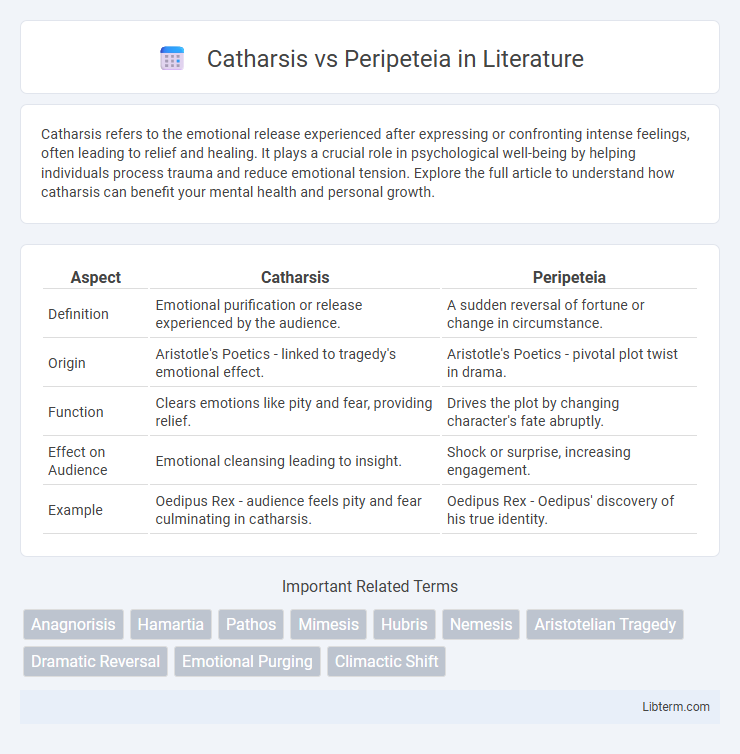Catharsis refers to the emotional release experienced after expressing or confronting intense feelings, often leading to relief and healing. It plays a crucial role in psychological well-being by helping individuals process trauma and reduce emotional tension. Explore the full article to understand how catharsis can benefit your mental health and personal growth.
Table of Comparison
| Aspect | Catharsis | Peripeteia |
|---|---|---|
| Definition | Emotional purification or release experienced by the audience. | A sudden reversal of fortune or change in circumstance. |
| Origin | Aristotle's Poetics - linked to tragedy's emotional effect. | Aristotle's Poetics - pivotal plot twist in drama. |
| Function | Clears emotions like pity and fear, providing relief. | Drives the plot by changing character's fate abruptly. |
| Effect on Audience | Emotional cleansing leading to insight. | Shock or surprise, increasing engagement. |
| Example | Oedipus Rex - audience feels pity and fear culminating in catharsis. | Oedipus Rex - Oedipus' discovery of his true identity. |
Understanding Catharsis: Definition and Origins
Catharsis, originating from Aristotle's Poetics, refers to the emotional purging or cleansing experienced by an audience through art, particularly tragedy. It involves the release of feelings such as pity and fear, leading to psychological renewal and restoration. This concept is fundamental to classical drama and remains a key element in understanding emotional engagement in storytelling.
Peripeteia Explained: A Turning Point in Drama
Peripeteia, a crucial concept in classical drama, refers to a sudden reversal of fortune or change in circumstances that dramatically alters the protagonist's trajectory. This turning point intensifies the narrative, driving the plot toward its climax and evoking a profound emotional response from the audience. Unlike catharsis, which is the purging or cleansing of emotions, peripeteia functions as the pivotal moment that triggers the emotional and thematic resolution within a tragedy.
Catharsis vs Peripeteia: Key Differences
Catharsis and peripeteia are pivotal concepts in classical drama, with catharsis referring to the emotional purification or relief experienced by the audience, while peripeteia denotes a sudden reversal of fortune in the protagonist's journey. Catharsis aims to evoke feelings of pity and fear that lead to an emotional cleansing, whereas peripeteia drives the plot by triggering a critical turning point that upends the narrative trajectory. Understanding the distinction between catharsis and peripeteia is crucial for analyzing tragic works, as catharsis shapes the audience's emotional response, and peripeteia influences the story's structural dynamics.
Historical Background: Aristotle’s Poetics
Aristotle's Poetics, written in the 4th century BCE, introduces catharsis and peripeteia as essential components of Greek tragedy that shape audience experience. Catharsis refers to the emotional purification or relief spectators undergo through feelings of pity and fear, while peripeteia denotes a sudden reversal of fortune that propels the plot into unexpected directions. These concepts establish a foundational framework for analyzing dramatic structure and the psychological impact of storytelling in classical literature.
The Role of Catharsis in Tragic Drama
Catharsis in tragic drama functions as a psychological purification, enabling audiences to experience intense emotions of pity and fear, leading to emotional release and moral renewal. This process deepens the impact of the plot's peripeteia, or sudden reversal of fortune, by allowing viewers to reconcile with the consequences of the protagonist's downfall. Aristotle's Poetics highlights catharsis as essential to the tragedy's purpose, promoting both emotional and ethical insight through the dramatic experience.
Peripeteia’s Impact on Plot Development
Peripeteia, a sudden reversal of fortune or change in circumstances, serves as a pivotal turning point in plot development by dramatically altering the trajectory of the narrative. This shift deepens character complexity and heightens emotional engagement, compelling the protagonist to confront new challenges or revelations. Unlike catharsis, which provides emotional release for the audience, peripeteia intensifies the story's momentum, driving the plot toward its climax and ultimate resolution.
Emotional Responses: Catharsis in Audience Experience
Catharsis involves the purging of strong emotions such as pity and fear, leading to a sense of emotional cleansing and relief in the audience. Peripeteia refers to a sudden reversal of fortune in a narrative that intensifies emotional engagement and heightens dramatic tension. While peripeteia triggers shock and surprise, catharsis provides a profound emotional resolution that allows audiences to process and release pent-up feelings.
Examples of Catharsis and Peripeteia in Literature
Catharsis in literature is exemplified by Shakespeare's *Macbeth*, where the audience experiences emotional purification through Macbeth's tragic downfall and the consequences of his ambition. Peripeteia is vividly portrayed in Sophocles' *Oedipus Rex*, where Oedipus' reversal of fortune occurs upon the revelation of his true parentage, drastically shifting his status from king to tragic outcast. Both elements function to evoke profound emotional responses and highlight pivotal moments of transformation in the narrative.
Modern Interpretations: Catharsis and Peripeteia Today
Modern interpretations of catharsis emphasize its psychological impact, viewing it as a process that promotes emotional release and healing through narrative engagement. Peripeteia is understood as a powerful plot mechanism that triggers profound shifts in character development or story direction, often used in contemporary storytelling to enhance suspense and audience investment. Both concepts are integral to analyzing modern drama and film, revealing how emotional transformation and unexpected reversals shape viewer experience.
Why Catharsis and Peripeteia Matter in Storytelling
Catharsis and peripeteia are crucial in storytelling because they drive emotional engagement and narrative transformation. Catharsis enables the audience to experience a profound emotional release, fostering empathy and connection with characters. Peripeteia, or sudden reversal, intensifies the plot by introducing unexpected twists that challenge characters and heighten dramatic tension.
Catharsis Infographic

 libterm.com
libterm.com